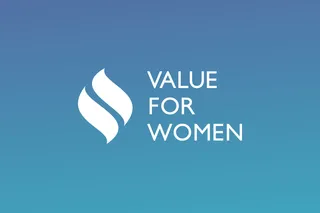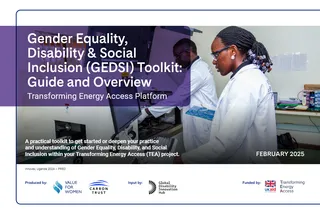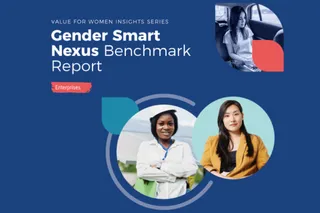
When entrepreneur Abhishek Pathak launched his solar-powered loom company in the Indian province of Uttar Pradesh, he had a mission beyond selling his product. He wanted to improve the livelihoods of the rural women he intended to employ. Making those hires was an important step.
Missions like Pathak's are bold and brave -- and they give businesses a chance to argue for change in the private sector. But when his company, Greenwear, became one of the enterprises selected for Powering Livelihoods, an accelerator program led by Villgro India and the Council on Energy, Environment and Water , he saw that gender inclusion could go much, much further.
"We always tell our portfolio companies not to do gender inclusion as a token gesture. Rather, we talk about how it can make their workforce more effective and open up new customer categories, said Ananth Aravamudan, Energy Sector Lead at Villgro and Powering Livelihoods representative. We tell them how gender inclusion actually makes business sense."
Its a framing that is often muted during International Women's Month, when we hear a lot from the private sector about the need to advance and protect women's legal rights. For businesses who already comply with whatever is on the books, advancing gender inclusion becomes about more than achieving or defending rights. Its an ongoing iterative experience, one where the process, in all its nitty-gritty glory, is the point.
Businesses can do this work every single day, even -- especially -- if their product or service is not overtly tied to gender.
On the surface, the portfolio companies in Powering Livelihoods do not seem like obvious candidates for a gender-forward business strategy. Their primary mission is to support solar-powered appliance enterprises that, if scaled, could help transform Indias rural economy. In fact, Greenwear is the only enterprise in the cohort which explicitly states a gender-related goal in their mission statement. When Value for Women began working with them, however, opportunities began to emerge across their value chain. For instance: most of the solar-powered looms were being used and purchased by women.
With Greenwear, women weren't just employees - women were also the ones making the financial decisions about purchasing the product, and they were the ones using it after purchase, said Rebecca Fries, Founder and Chief Executive Officer at Value for Women. Our team of Gender and Business experts worked with Greenwear to think about, how does this impact the financing options for purchase? How does this inform design and manufacturing if women are the primary end users?
Because companies like Greenwear are smaller, newer, and still tinkering with their model, theres more freedom to experiment with their approach.
Value for Women is working to bring this type of intentional thinking about gender to businesses of all sizes. The Gender Forward Business Framework, which we developed with input from businesses, investors, and entrepreneurs, as well as programs like Powering Livelihoods, is an entry point for identifying gaps and addressing them.
The framework helps businesses look beyond single issues like boardroom representation and at the role of gender in day-to-day operations, adds Rebecca. Its also a more manageable place to start: they don't need to completely change everything overnight. They need to pick focus areas based on where they are in their growth cycle and journey.
In the next few months, Value for Women will be doing this on an even larger scale with our Gender Smart Nexus tool, an online assessment that generates recommendations across everything from hiring to product design, development and sales. Businesses can compare their gender inclusion efforts to peers operating in their sector or geographic area.
The sort of transformation that can come from examining gender inclusion throughout a business is powerful. Its also a way to channel the energy we see animating discussions during International Women's Month into steps businesses can take every day, starting with a deeper look at what they do and who they do it with.
If we can normalize asking questions about gender at each point in decision-making, we can transform how business is conducted. Lets learn from this month dedicated to pioneering women, and take revolutionary steps every day of the year. Join us in making gender equality a journey and not a destination.

As CEO and Co-founder of Value for Women, Rebecca has spearheaded the growth of the organization into a globally recognized leader in gender-inclusive business practice. With over 20 years of global expertise, Rebecca leads Value for Women in its efforts to design innovative gender-inclusion products and methods, working hand-in-hand with investors, businesses, banks, financial institutions, development organizations, and corporate foundations.


